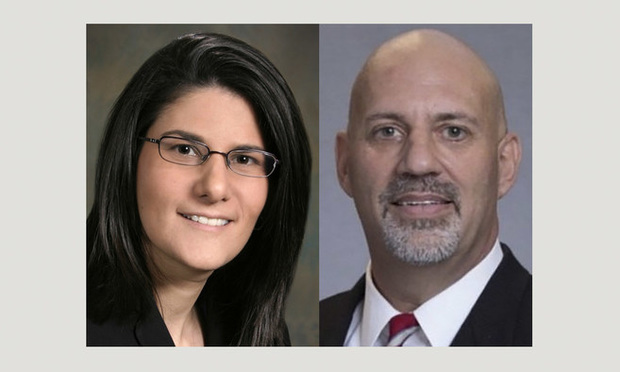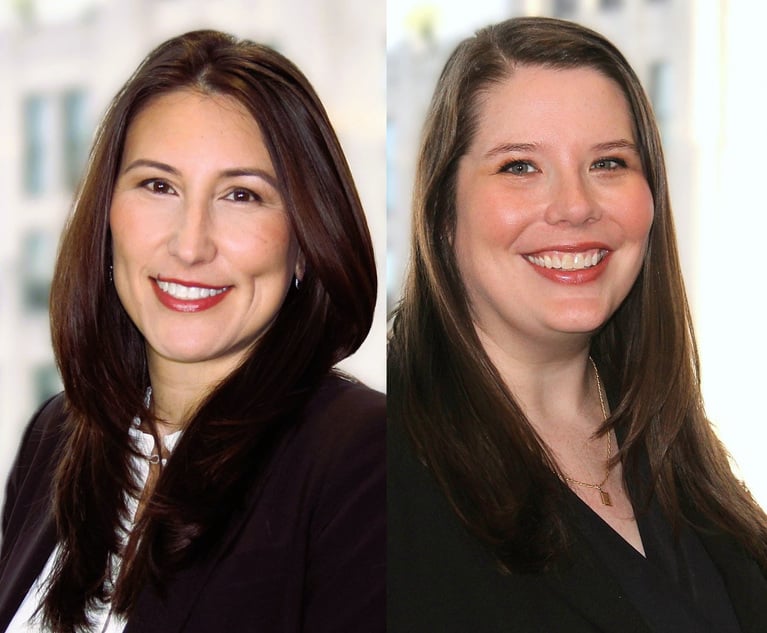Recording Online Meetings: A Guide to eDiscovery Best Practices
Because of the potential for exposure that recorded calls may have, it is important to understand when and where those recordings can be used and if the risk of recorded online meetings is something you need to mitigate against.
November 08, 2019 at 11:09 AM
4 minute read
 Gina M. Vitiello (left), shareholder in the Atlanta office of Chamberlain Hrdlicka, and Patrick Kennedy, director of eDiscovery at Andrews Myers. (Courtesy photos)
Gina M. Vitiello (left), shareholder in the Atlanta office of Chamberlain Hrdlicka, and Patrick Kennedy, director of eDiscovery at Andrews Myers. (Courtesy photos)
Using online meeting software is commonplace in business. If you haven't hosted a meeting using GoToMeeting, WebEx, Zoom or a host (no pun intended) of other software products, chances are you have likely attended an online meeting yourself, as it's increasingly necessary for individuals to meet online and share screens, video feeds, documents and side-conversations with up to hundreds of people at a time.
While online meetings can save companies time and travel expenses, the ability to record such meetings presents a unique challenge when litigation is involved. A quick review of the major meeting software products listed above shows that all include the ability for meetings to be recorded and saved for later use. Most allow the recording to capture not only what the speakers on the call say, but any screens that are shared, side conversations that occur in the "chat" window and a full list of participants who have logged into the meeting.
What happens to those recordings after the call ends? That depends largely on how the software administrator and/or individual host has set it up. Recorded files are saved either to the local machine of the person who hosted the call or on the server where the software resides; the host of the session makes this choice.
These records can cause issues on both ends of the call cycle. Firstly, when a meeting invitation is issued, users may not be aware that the meeting is being or could be recorded; therefore, a disclaimer may be necessary when an invitation to such a call goes out. Secondly, where the resulting recorded file is saved could affect which custodians and servers need to be included in an eDiscovery request.
As for the first issue, we recommend that all online meeting invitations be accompanied with a disclosure statement similar to the following:
"IMPORTANT NOTICE: Please note that this {Name of Meeting Software} service allows audio and other information sent during the session to be recorded, which may be discoverable in a legal matter. By joining this session, you automatically consent to such recordings. If you do not consent to being recorded, discuss your concerns with the host or do not join the session. Rules regarding the recording of communications differ from jurisdiction to jurisdiction. Please check the rules on this topic in your respective jurisdiction."
This prompts any potential attendees to ask if a recording will be made and opt out of the call if they feel it is problematic for any reason. Alternatively, potential attendees will have the option to request that the host not record.
To the second point, eDiscovery hinges on collecting the right electronically stored information from the right places. Those places can include such things as email boxes and network share drives from individuals who are involved in the suit. But as we have learned, eDiscovery professionals should also ask where meeting software file recordings are stored so that those locations can also be included the collection.
We have personally hosted or attended over 200 of such meetings, and that number could likely be exponentially larger for others. Because of the potential for exposure that recorded calls may have, it is important to understand when and where those recordings can be used and if the risk of recorded online meetings is something you need to mitigate against.
Gina M. Vitiello is a shareholder in the Atlanta office of Chamberlain Hrdlicka. Patrick Kennedy is the director of eDiscovery at Andrews Myers.
The views and recommendations expressed in this article are solely those of its authors. The Daily Report does not give legal advice and makes no warranties about the completeness or accuracy of recommendations offered in opinion pieces submitted by outside authors.
This content has been archived. It is available through our partners, LexisNexis® and Bloomberg Law.
To view this content, please continue to their sites.
Not a Lexis Subscriber?
Subscribe Now
Not a Bloomberg Law Subscriber?
Subscribe Now
NOT FOR REPRINT
© 2025 ALM Global, LLC, All Rights Reserved. Request academic re-use from www.copyright.com. All other uses, submit a request to [email protected]. For more information visit Asset & Logo Licensing.
You Might Like
View All

CFPB Proposes Rule to Regulate Data Brokers Selling Sensitive Information
5 minute read
Trending Stories
- 1Is It Time for Large UK Law Firms to Begin Taking Private Equity Investment?
- 2Federal Judge Pauses Trump Funding Freeze as Democratic AGs Launch Defensive Measure
- 3Class Action Litigator Tapped to Lead Shook, Hardy & Bacon's Houston Office
- 4Arizona Supreme Court Presses Pause on KPMG's Bid to Deliver Legal Services
- 5Bill Would Consolidate Antitrust Enforcement Under DOJ
Who Got The Work
J. Brugh Lower of Gibbons has entered an appearance for industrial equipment supplier Devco Corporation in a pending trademark infringement lawsuit. The suit, accusing the defendant of selling knock-off Graco products, was filed Dec. 18 in New Jersey District Court by Rivkin Radler on behalf of Graco Inc. and Graco Minnesota. The case, assigned to U.S. District Judge Zahid N. Quraishi, is 3:24-cv-11294, Graco Inc. et al v. Devco Corporation.
Who Got The Work
Rebecca Maller-Stein and Kent A. Yalowitz of Arnold & Porter Kaye Scholer have entered their appearances for Hanaco Venture Capital and its executives, Lior Prosor and David Frankel, in a pending securities lawsuit. The action, filed on Dec. 24 in New York Southern District Court by Zell, Aron & Co. on behalf of Goldeneye Advisors, accuses the defendants of negligently and fraudulently managing the plaintiff's $1 million investment. The case, assigned to U.S. District Judge Vernon S. Broderick, is 1:24-cv-09918, Goldeneye Advisors, LLC v. Hanaco Venture Capital, Ltd. et al.
Who Got The Work
Attorneys from A&O Shearman has stepped in as defense counsel for Toronto-Dominion Bank and other defendants in a pending securities class action. The suit, filed Dec. 11 in New York Southern District Court by Bleichmar Fonti & Auld, accuses the defendants of concealing the bank's 'pervasive' deficiencies in regards to its compliance with the Bank Secrecy Act and the quality of its anti-money laundering controls. The case, assigned to U.S. District Judge Arun Subramanian, is 1:24-cv-09445, Gonzalez v. The Toronto-Dominion Bank et al.
Who Got The Work
Crown Castle International, a Pennsylvania company providing shared communications infrastructure, has turned to Luke D. Wolf of Gordon Rees Scully Mansukhani to fend off a pending breach-of-contract lawsuit. The court action, filed Nov. 25 in Michigan Eastern District Court by Hooper Hathaway PC on behalf of The Town Residences LLC, accuses Crown Castle of failing to transfer approximately $30,000 in utility payments from T-Mobile in breach of a roof-top lease and assignment agreement. The case, assigned to U.S. District Judge Susan K. Declercq, is 2:24-cv-13131, The Town Residences LLC v. T-Mobile US, Inc. et al.
Who Got The Work
Wilfred P. Coronato and Daniel M. Schwartz of McCarter & English have stepped in as defense counsel to Electrolux Home Products Inc. in a pending product liability lawsuit. The court action, filed Nov. 26 in New York Eastern District Court by Poulos Lopiccolo PC and Nagel Rice LLP on behalf of David Stern, alleges that the defendant's refrigerators’ drawers and shelving repeatedly break and fall apart within months after purchase. The case, assigned to U.S. District Judge Joan M. Azrack, is 2:24-cv-08204, Stern v. Electrolux Home Products, Inc.
Featured Firms
Law Offices of Gary Martin Hays & Associates, P.C.
(470) 294-1674
Law Offices of Mark E. Salomone
(857) 444-6468
Smith & Hassler
(713) 739-1250







